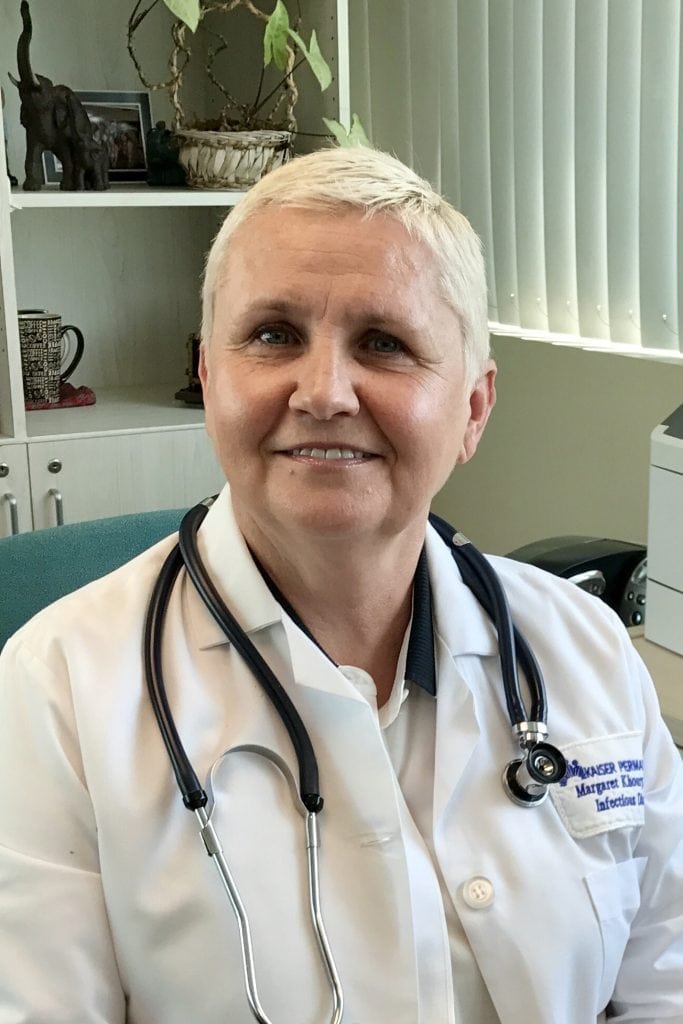 Cold and flu season is upon us. Margaret Khoury, M.D., pediatric infectious disease specialist and the regional lead of the Kaiser Permanente Southern California Flu Vaccination Program, says we never know how long or severe the season will be, but that Australia – which has its flu season during our summer – has reported an early start to the season and twice as many cases of flu as they had last year. “We are really very worried that this is going to be a tough winter for all of us,” she says.
Cold and flu season is upon us. Margaret Khoury, M.D., pediatric infectious disease specialist and the regional lead of the Kaiser Permanente Southern California Flu Vaccination Program, says we never know how long or severe the season will be, but that Australia – which has its flu season during our summer – has reported an early start to the season and twice as many cases of flu as they had last year. “We are really very worried that this is going to be a tough winter for all of us,” she says.
While the common cold is generally a milder illness kids’ bodies can battle on their own, the flu will keep your child in bed for a week or two – and can cause life-threatening complications.
This means it’s best to get your family’s flu shots by the end of the month. “No trick-or-treating for Halloween without flu vaccine,” says Khoury.
What is the difference between a cold and the flu, and how can parents tell?
Colds are very common in children during winter season, and they can start as early as September, after school starts and kids start to interact with each other. There is a variety of different viruses that can cause them, and they are usually milder. Kids may have a little bit of fever, runny nose and cough and just don’t feel well. It usually takes kids seven to 10 or 14 days to recover, and common colds don’t usually cause complications. Sometimes a child can develop an ear infection, sometimes they can develop a chest infection, and they may require antibiotics for those complications. But most common colds will go away on their own. The child’s immune system can handle it.
Influenza or flu is a more serious infection. It always comes with high fever, body aches and sore throats. A lot of kids may have a stomach upset with vomiting and diarrhea. The infection usually is quite severe for a good five to seven days, where kids are not able to attend school, they’re quite ill, they have no energy, they don’t feel well. Influenza also puts kids, especially the younger ones, at risk for serious complications such as severe pneumonia, brain infection or heart infection.
What is happening with the intranasal flu vaccine this year?
Like last year, flu vaccine only comes as a shot. For the past two years, the U.S. Centers for Disease Control and Prevention does not recommend the intranasal or the spray flu vaccine, because we found it was not protective against certain strains of influenza A.
What is your number-one strategy for helping kids deal with their shots with a minimum of discomfort?
Younger kids are the ones that are more anxious about getting shots. We always engage parents to distract kids and to help them get through it. The longer kids wait for the shot, the more anxious they get, so we try to make it as quick and as comfortable as possible. We do acknowledge, especially with older kids, that the shot will hurt, but it’s a quick poke and then it’s gone. No matter how you approach it, there is going to be some associated pain. We never lie to kids about it. And we acknowledge that nobody likes shots. I don’t like getting shots, but we take it because we want to stay healthy.
Remind our families of all the preventive measures that we are supposed to teach our children, along with giving them the flu vaccine.
To stay healthy, you need to keep a healthy lifestyle. We really encourage our parents and our children to go to bed on time. Sleep is very important in keeping ourselves healthy. We encourage kids to make the right healthy choices food-wise. The healthier our diets, the healthier our immune system. So, we tell them, “Go green. Let’s eat those veggies. They are very important in our diet.”
Of course we teach everyone that hand-washing is very, very important. Especially when we come from outside, when we prepare food and before we eat, we want to make sure that those hands are as clean as possible.
We also ask our kids to cover their cough. When we’re sick, we don’t want to cough on somebody else, so we tell them, “Be a vampire. Cover your cough.” You can either cough into your sleeve, or sneeze or cough into a tissue. If we don’t have anything available and we end up coughing into our hands, we need to wash those hands.
What is the biggest mistake that parents make when their kids get sick?
Sometimes, we don’t recognize that kids are sick, and we continue our routine and activities at the same pace. That creates problems because we need extra sleep and we need to trim off unnecessary activities when we’re not feeling well.
If the child has fever, they should stay home. They shouldn’t be sent to school if they’re not feeling well, because that will only make the recovery longer. This is the time to say maybe no soccer game or no soccer practice until we feel better.
How does a parent know whether to keep a child with the sniffles home from school?

Margaret Khoury, M.D., is a pediatric infectious disease specialist and the regional lead of the Kaiser Permanente Southern California Flu Vaccination Program.
Sniffles alone, when the child is otherwise feeling well and has good energy, are not a reason to keep the child at home. But if the child is having high fever, feeling tired, having vomiting, just not themselves, then we should allow the child to rest for a day or two at home until those symptoms improve. If the child is not feeling well stomach-wise, or has vomiting, that also is not a good time to send them to school. We just need to be smart about making that decision.
How does a parent know whether they should take a child who seems to have a cold or the flu to the doctor?
We recommend for parents to be very watchful for any complications of common colds. If their child has fever lasting longer than three days, is unusually sleepy, doesn’t want to drink liquids, is having difficulty breathing, if they look pale, if they’re not keeping their liquids down, you definitely need to seek medical care.
It is expected that kids with a common cold should be starting to feel better by day five. So, if they’re not feeling better, then we need to think, “Is there something else going on?” And that warrants a visit with the doctor.
Even if we get our kids their flu shots and are very careful to take the preventive measures we should, how many colds can we expect our kids to get this season?
The younger the child, the higher the chance of having recurrent infections during the winter season, especially if this is their first year in preschool or daycare or school. It is not unusual, in the four to six months of the winter season, for a child to have one to two infections a month. Parents should be prepared that that first season may be a tough season, but the next season will be better. If we practice all those healthy approaches to winter season, we still have a good chance of getting sick here and there, but if we really pay attention and follow all those recommendations, we can make the infections less frequent and we also can make the recovery faster.

























